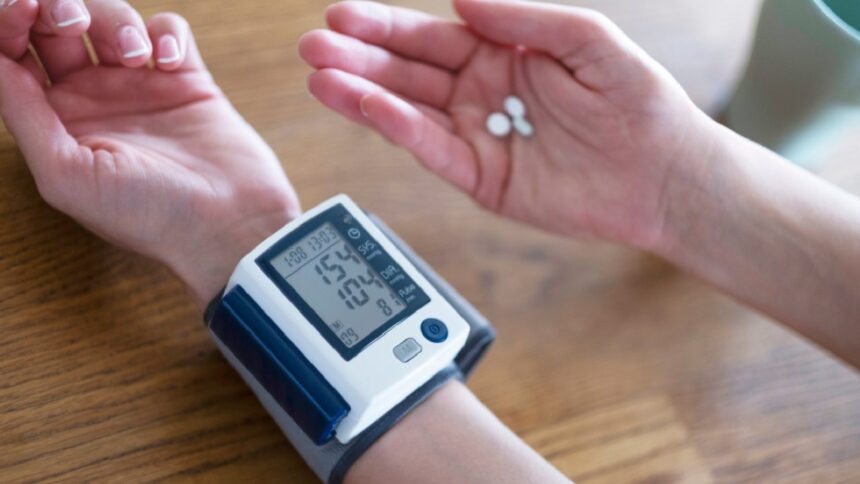Whereas there are a number of causes of hypertension, some medicines can elevate the chance. Listed below are 9 frequent medicines which are silently elevating your blood strain ranges.
Hypertension or hypertension, is a widespread challenge affecting about 1.3 billion folks globally. It’s the main preventable danger issue for heart problems, claiming round 10 million lives every year, in line with the World Coronary heart Federation. Whereas managing hypertension is essential, many individuals don’t realise that sure medicines can contribute to rising blood strain with out them even understanding. From frequent painkillers and antidepressants to decongestants, these medication can pose a big danger, particularly for these already coping with hypertension. It’s important to pay attention to these medicines and their potential results, so study whether or not it is likely one of the causes of hypertension.
What’s hypertension?
Hypertension happens when the pressure of blood towards the partitions of your arteries is just too excessive. This will pressure your coronary heart and blood vessels, resulting in well being issues like coronary heart illness, stroke, and kidney harm. Blood strain is measured in millimetres of mercury (mm Hg) and is recorded as two numbers: systolic (strain throughout a heartbeat) and diastolic (strain between heartbeats). A standard studying is normally round 120/80 mm Hg. Hypertension is usually outlined as having a studying of 130/80 mm Hg or greater.
9 medicines that may trigger hypertension
Whereas there are a number of causes of hypertension, sure medicines may also trigger a spike, together with:
1. Nonsteroidal anti-inflammatory medication (NSAIDs)
“NSAIDs embrace each prescription and over-the-counter medicines generally used for fast aid from persistent ache and to cut back irritation, notably in circumstances like arthritis,” explains heart specialist Dr Sameer V Pagad. Nonetheless, these medicines may cause the physique to retain extra fluid, negatively impacting kidney perform. When the kidneys will not be working effectively, it will probably result in important fluctuations in blood strain, finally leading to hypertension. Moreover, taking NSAIDs, particularly in greater doses or taking them for one week, one month, or multiple month, can enhance the chance of coronary heart assault or stroke, in line with a examine revealed within the British Medical Journal.

NSAIDs are additionally current in numerous over-the-counter merchandise, comparable to chilly medicines. It’s advisable to seek the advice of your physician to find out whether or not NSAIDs are appropriate for you. Your doctor could recommend options, like acetaminophen as a substitute of ibuprofen.
2. Corticosteroids or steroids
Corticosteroids, generally known as steroids, are medicines designed to imitate hormones produced by the adrenal glands. They assist scale back irritation and suppress the immune system. Nonetheless, common use of corticosteroids can considerably enhance sodium reabsorption within the kidneys, resulting in fluid retention. This fluid buildup can place additional pressure on blood vessels, inflicting them to constrict and leading to elevated blood strain ranges. A examine revealed by the Canadian Respiratory Journal additionally discovered a hyperlink between the usage of oral corticosteroids and the prevalence of hypertension and acute myocardial infarction, often known as coronary heart assault.
Moreover, corticosteroids can disrupt the metabolism of your physique and contribute to weight acquire, which can additional exacerbate hypertension. Increased doses of those medicines are related to a fair higher danger of elevated blood strain.
Hypertension: Keep away from these 5 workout routines in case your blood strain is excessive
3. Chilly medicines or decongestants
Chilly medicines, notably decongestants, are generally used for fast aid from nasal congestion. They work by narrowing the blood vessels within the nasal passages, which reduces swelling. Nonetheless, many chilly and cough medicines additionally comprise NSAIDs to alleviate ache, and as beforehand talked about, NSAIDs can increase blood strain. Overusing these medicines could be detrimental to your blood strain ranges. Moreover, sure decongestants could stimulate the center and additional enhance blood strain and coronary heart assault, in line with the Annals of Emergency Drugs. Whereas these medication assist scale back nasal swelling, they will additionally constrict blood vessels all through the physique, contributing to hypertension.
When you have blood strain issues, it’s best to keep away from cough and chilly medicines containing NSAIDs or decongestants, particularly pseudoephedrine (Sudafed), which is understood to boost blood strain. Seek the advice of your physician for different choices to alleviate congestion, comparable to antihistamines or nasal sprays.
4. Antidepressants
Antidepressants are sometimes prescribed for folks coping with psychological well being points comparable to despair, nervousness, continual stress, panic dysfunction, and overthinking. When taken as directed by a healthcare supplier, these medicines can assist restore steadiness to the chemical substances within the mind that affect temper and emotional well-being. “Whereas hypertension is just not a typical facet impact of antidepressants, people with present hypertension could face an elevated danger. This danger can escalate additional with greater doses of the medicine,” says Dr Pagad. Examples of antidepressants which will contribute to hypertension embrace:
- Monoamine oxidase inhibitors (MAOIs)
- Tricyclic antidepressants (TCAs)
- Selective serotonin reuptake inhibitors (SSRIs)
It is very important monitor your blood strain often in case you are on antidepressants. Additionally, should you expertise elevated blood strain or discover it poorly managed, seek the advice of your healthcare supplier about different medicines.
5. Immunosuppressants
Immunosuppressants are medicines that weaken the immune system. They’re typically prescribed to stop organ rejection after a transplant or to handle flare-ups of autoimmune circumstances. Nonetheless, some immunosuppressants can result in elevated blood strain, reveals a examine revealed in Frontiers in Cardiovascular Drugs. Notable examples embrace cyclosporine (Sandimmune, Gengraf, and Neoral) and sirolimus (Rapamune). These medicines could increase blood strain by constricting blood vessels and inflicting the kidneys to retain salt. In case you are on immunosuppressants, it’s advisable to have your blood strain monitored often.

6. Migraine medicines
Migraines are linked to a better prevalence of heart problems (CVD) danger components, together with hypertension, diabetes, and hyperlipidemia, in line with a examine revealed by the American Academy of Neurology. Sure migraine medicines, comparable to triptans, relieve ache by constricting blood vessels within the head. Whereas efficient for managing migraine signs, these medication slim blood vessels all through the physique, probably resulting in hypertension, which can attain harmful ranges.
The identical examine highlights that medicines that constrict coronary arteries, together with triptans and compounds containing ergotamine, might enhance the chance of CVD in sufferers being handled for migraines. When you have hypertension or any heart-related circumstances, it’s important to seek the advice of your physician earlier than utilizing medicines for migraines or extreme complications.
7. Contraception with estrogen
Some people utilizing hormonal contraception, notably drugs containing estrogen, could expertise a rise in blood strain. “The vaginal ring has additionally been related to hypertension in some customers. Whereas trendy contraception strategies sometimes comprise decrease ranges of estrogen, this facet impact can nonetheless happen. Estrogen could contribute to elevated ranges of blood strain by rising ranges of a protein referred to as angiotensinogen, which converts to angiotensin II, a substance identified to boost blood strain, mentions Dr Pagad.
Generally, hormonal contraception doesn’t considerably influence blood strain. Nonetheless, when you’ve got present hypertension, your healthcare supplier could recommend utilizing a progestin-only tablet or different strategies, comparable to an arm implant or an intrauterine system (IUD).
8. Stimulants
Stimulants, comparable to methylphenidate (Concerta, Ritalin, and others), can result in an elevated coronary heart charge or irregular heartbeat, which can elevate blood strain, as per StatPearls. These medicines work by enhancing the exercise of particular chemical substances within the mind, bettering focus and a focus. Nonetheless, they will additionally enhance the chance of blood pressure-related points by activating the sympathetic nervous system, resulting in palpitations and constricted blood vessels, each of which contribute to greater blood strain. In case you are taking a stimulant, hold your blood strain in examine often.
9. Weight reduction medication
Sure weight reduction or weight problems medicines, comparable to sibutramine, can exacerbate coronary heart illness. These medicines can enhance your danger of cardiovascular ailments comparable to coronary heart assault, angina, stroke, coronary heart arrhythmias, and congestive coronary heart failure, in line with a examine revealed by the American Diabetes Affiliation. Urge for food suppressants, specifically, can enhance the exercise stage of your physique, resulting in elevated blood strain and added stress on the center. Earlier than beginning any weight reduction drug—whether or not prescription or over-the-counter—it’s important to seek the advice of your physician. Whereas these medicines can support in weight reduction, they might additionally pose dangers that outweigh their advantages.
In case you are taking any of those medicines, particularly when you’ve got a historical past of hypertension, it is very important hold a examine in your blood strain often and seek the advice of along with your healthcare supplier about the perfect choices to your well being.












